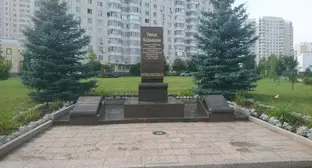27 June 2011, 22:00
Week in the Caucasus: review of main events of June 20-26
Broad-scale special operation in Dagestani forests: militants manage to deceive power agents and escape; the 70th anniversary of the start of the Great Patriotic War was marked in all regions of Southern and Northern Caucasus; arrests of oppositionists in Georgia in the context of another putsch statement; failed summit on Karabakh in Kazan, – look these and other events in the review of the week of June 20-26, 2011, prepared by the "Caucasian Knot".
Regions of Southern and Northern Caucasus mark 70 years after start of GPW
Actions and events dated to the 70th anniversary of the start of the Great Patriotic War (GPW) took place on June 22 in all regions of Southern Russia and in countries of Southern Caucasus.
In Yerevan, the capital of Armenia, like in many cities of the former Soviet Union, they started at 4.00 a.m. with laying flowers in memory of all the dead to the Eternal Flame. Also, plenty of people visited the memorial complex in the city of Dilijan – the biggest monument to Soviet soldiers in Southern Caucasus. In Tbilisi, the capital of Georgia, people lit candles and commemorated those who perished in the war against Nazi Germany with a minute of silence held in the Central Park "Vake" at the tomb of the Unknown Soldier. In Tskhinvali, an action named "We remember..." in memory of the start of the GPW was attended mainly by young people.
On the Day of Memory and Sorrow, several dwelling settlements of Northern Caucasus opened new monuments. Thus, on June 22, the aul of Novo-Kuvinsk, Adyge-Khabl District of Karachay-Cherkessia, hosted a solemn opening ceremony of a monument to fallen worriers; on the same day the city of Ipatovo, Stavropol Territory, opened a memorial sign "To Russian Soldiers in Local Conflicts"; and the Ingush city of Magas opened a monument to employees of power agencies and law enforcers of Ingushetia, who perished while performing their duties.
In Rostov-on-Don, on June 22, a night screening of films about the war was dated to the 70th anniversary of the start of the GPW; on the same day a mourning ceremony of reburial of 70 Red Army soldiers, who perished during the War in the outskirts of the city was held. In Grozny, on June 22, a conference "Brest Fortress – Example of Heroism" took place; and the Prefecture of the Zaterechny Municipal District of North Ossetia hosted a dispute "Patriotism – in words?" within the cycle of meetings "Dialogue of Generations".
On the eve of the Day of Memory and Sorrow some Russian cities held an international action "Candle of Memory" – on June 21 in the evening participants of the action lit candles in the form of the number 22. These actions took place in Elista, Volgograd and Krasnodar. In Nalchik, on June 22, 70 candles were lit in memory of the start of the Great Patriotic War at the Eternal Flame – one candle for every elapsed year.
Georgia: oppositionists arrested on putsch accusations
On June 23, the Georgian Ministry of Internal Affairs (MIA) announced detention of an eight-person-strong organized criminal grouping, where some members were associated with the oppositional "Georgian Party". According to the MIA, the detainees had tried to set up an armed unit in support of the former Georgian Defence Minister Irakli Okruashvili during his return to Georgia from Russia.
Let us note here that starting May 9 the "Georgian Party" launched its nationwide protest actions with a demand of change of power. On May 20, Irakli Okruashvili, who is abroad, said that in the coming days the Georgian people "would say farewell to Saakashvili's regime." In his turn, Shota Utiashvili, head of the information-analytical department of the Georgian MIA, said that if Okruashvili came to Georgia, he would be arrested. Later it became known that Okruashvili would not return to Georgia; and the "Georgian Party" cancelled the "Day of Wrath" scheduled for May 25.
In the records made public by the MIA on June 24, one of the June 23 detainees – Giorgi Saatashvili, a former employee of the Georgian Ministry of Defence, – said that the detainees had planned to attack, together with a detachment of two hundred Russian special agents, first the Georgian block posts at the "occupation line", and then – the base of special troops in Karaleti and the police in Gori.
The "Georgian Party" has treated the MIA's accusations as absurd MIA; the detainees' relatives also consider the charges groundless. However, on June 24, in the course of a plenary session of the Georgian parliament, the MPs stated that Okruashvili should face the Georgian justice, believing that the MIA had provided the Georgian public with exhausting evidences that a putsch had been planned in the country.
Dagestan: big grouping of militants managed to escape from power agents
In the morning on June 21, near the village of Kuznetsovka, Kizlyar District of Dagestan, in a dense wooded area, power agents entered an armed clash with armed militants, after what the former party had to involve heavy armoured machinery and helicopters in the special operation aimed to search the remaining militants. However, on June 22 they managed to break through the cordon. Power agents said that the remaining grouping was about 30 persons strong. On June 23, the special operation was continued. The locality, where the militants were hiding, was cordoned off; and thermal imagers were installed; however, the members of the underground once again managed to escape, this time without fire contact.
After that, law enforcement officials have suggested that the attempt to break through the cordon at night on June 22 was, most likely, a deceptive manoeuvre of a part of the grouping, aimed to allow the main regiment to escape. In the area of the special operation, power agents found a militants' summer camp, where two ready to use improvised explosive devices were detected.
Power agents have suffered heavy losses – it was reported about 13 killed and 19 wounded Russian MIA and FSB agents; however, officially 5 dead and 13 injured power agents were confirmed. There was also information about five liquidated members of the armed underground. However, according to the spokesman of the Investigatory Department for Dagestan of the Investigatory Committee of the Russian Federation (ICRF), only two bodies of assassinated militants were presented to investigators for identification.
Karabakh conflict: "Basic Principles" remains unsigned
On June 25, the city of Kazan hosted a tripartite meeting of Presidents of Azerbaijan, Armenia and Russia Ilham Aliev, Serzh Sargsyan and Dmitry Medvedev to discuss the settlement of the Nagorno-Karabakh conflict. No significant progress in the negotiations was reached.
Armenian experts and state officials accuse the leadership of Azerbaijan of unconstructive behaviour. Thus, according to Edward Nalbandyan, Armenian Foreign Minister, the Azerbaijani side has offered a dozen amendments to the latest version of the "Basic Principles" proposed by the co-chairs, in spite of the fact that the countries-co-chairs of the OSCE Minsk Group, US President Obama and President of France Sarkozy had called on Presidents of Armenia and Azerbaijan to reach agreement in Kazan.
Azerbaijan accuses Armenia of intransigence and is dissatisfied with the position of mediators in the Karabakh settlement. Elmar Mamedyarov, Azerbaijani Foreign Minister, said that no compromise solution could be reached on a number of fundamental issues, because "the Armenian party demanded maximum concessions from Azerbaijan by distorting the essence of the negotiation process that had been launched seven years ago." At the same time, he called the Kazan meeting "the longest among those held in this format."
On the eve of the meeting in Kazan, public figures of Nagorno-Karabakh, which is the focus of the conflict, issued a statement reading that the signing by Armenia and Azerbaijan of a document with the "Basic Principles" of Karabakh settlement without account of the opinion of Nagorno-Karabakh residents will destabilize the situation in the region.




